Too Late Blues Blu-ray Movie
HomeToo Late Blues Blu-ray Movie 
Olive Films | 1961 | 101 min | Not rated | May 29, 2012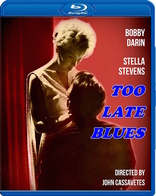
Movie rating
6.5 | / 10 |
Blu-ray rating
| Users | 0.0 | |
| Reviewer | 3.0 | |
| Overall | 3.0 |
Overview
Too Late Blues (1961)
Ghost is an idealogical musician who would rather play his blues in the park to the birds that compromise himself. However, when he meets and falls in love with beautiful singer, Jess Polanski, she comes between him and his band members, and he leaves his dreams behind in search of fame.
Starring: Bobby Darin, Stella Stevens, Everett Chambers, Vince Edwards, Val AveryDirector: John Cassavetes
| Drama | Uncertain |
| Music | Uncertain |
Specifications
Video
Video codec: MPEG-4 AVC
Video resolution: 1080p
Aspect ratio: 1.78:1
Original aspect ratio: 1.85:1
Audio
English: DTS-HD Master Audio Mono
Subtitles
None
Discs
25GB Blu-ray Disc
Single disc (1 BD)
Playback
Region A (B, C untested)
Review
Rating summary
| Movie | 3.0 | |
| Video | 3.5 | |
| Audio | 3.5 | |
| Extras | 0.0 | |
| Overall | 3.0 |
Too Late Blues Blu-ray Movie Review
Stella!
Reviewed by Jeffrey Kauffman May 19, 2012For a certain class of moviegoer, the name of John Cassavetes will be forever linked with his smoothly menacing turn as ambitious actor Guy Woodhouse in Roman Polanski’s film version of the brilliant Ira Levin novel Rosemary’s Baby. Cassavetes was always a really interesting screen presence, whether in his short-lived detective television series Johnny Staccato or in any number of films, projects which spanned a hugely disparate array of styles and content and included everything from The Dirty Dozen to Paul Mazursky’s revisionist Tempest. But for a whole other class of moviegoer, the name of John Cassavetes doesn’t necessarily mean “actor,” and instead is more firmly linked with that ever contentious label auteur. Cassavetes was one of the first American filmmakers to espouse an independent production model, a model which included his input in everything from writing, directing, and even occasionally producing and editing. Cassavetes also followed in the footsteps of other notable auteurs like Orson Welles in building a quasi-repertory company of actors who regularly inhabited roles in Cassavetes’ films. Cassavetes’ first independent film was 1959’s Shadows, a decidedly lo-fi affair that nonetheless caught the eye of Paramount, which in turn offered Cassavetes a major studio deal. It’s rather astounding to think of this happening circa 1959-60, an era not exactly known for its support of anachronistic and idiosyncratic talents. And it’s probably no mere coincidence that Cassavetes chose the world of jazz to build his first major feature film around, for the improvisatory nature of that musical art form would infuse all of Cassavetes’ film work, to varying degrees of effectiveness.
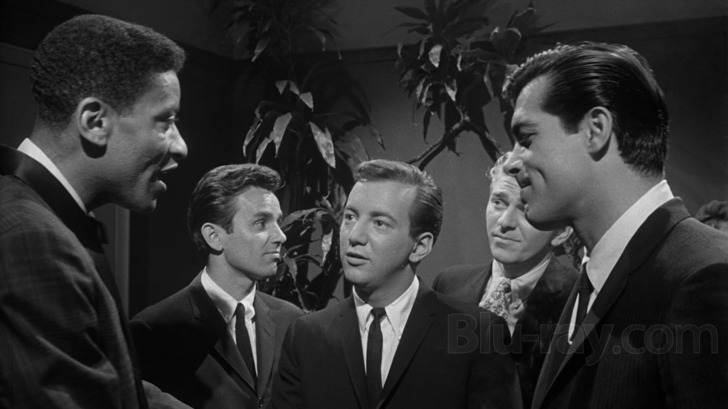
The old conflict of Art vs. Commerce is certainly nothing new, especially not in the sort of “kitchen sink” 20th century outings of such notables as Clifford Odets, a tradition that Cassavetes either knowingly or unwittingly follows in Too Late Blues. Here we have the pig headed jazz combo leader Ghost (Bobby Darin), a man who is convinced his way of writing and playing jazz is pure and artistically relevant. But the siren call of hit records and large paychecks is sounding from the wings, and it’s exacerbated once Ghost picks up a floozy named Jess (Stella Stevens), a girl who just might be able to sing and whom Ghost wants to shoehorn into both his career and his personal life. That’s basically the sum total of the “plot” of Too Late Blues, a film that really doesn’t have a lot of actual story mechanics and instead focuses on the interplay between some fairly desperate characters.
Darin was an odd character (read his son Dodd Darin’s reminiscence of his famous parents if you want to find out just how odd), and he brings a certain sullenness combined with an almost palpable vulnerability to the role. Once Ghost decides to “cash in”, he finds a patron (or patroness) of sorts in a wealthy older woman (played very well by Marilyn Clark), and a scene late in the film where Ghost has a showdown with his boorish agent (Everett Chambers) in a dressing room where Clark’s Countess character is also present is a potent distillation of Ghost’s anger, stubbornness and kind of bizarre pride. While Too Late Blues doesn’t have the freewheeling approach that would become a Cassavetes hallmark in his later films, there’s a certain freedom on tap here that sets this film apart from some of its more scripted kin like Pete Kelly’s Blues, another film from this same general era which sought to portray the lives of itinerant musicians, albeit in a more traditional melodramatic potboiler fashion.
The real surprise here from a performance standpoint is the devastatingly effective work by Stella Stevens, an actress who often seemed consigned to bimbo roles simply because she was so gorgeous. Here, playing a self destructive but deeply passionate woman, Stevens brings an innate intelligence to the role and gives one of the most memorable performances of her career (and, no, that isn’t a backhanded compliment). The role is something that Shirley MacLaine could have played to a tee at that stage of her career, and Stevens, who rather resembles MacLaine in this film, manages the same sort of steely vulnerability that Shirley evinced in such films as Some Came Running. If you’ve only seen Stevens in films like The Nutty Professor or The Poseidon Adventure, prepare yourselves for at least a minor revelatory experience.
The film, like jazz itself, is meandering and even self indulgent at times, and Cassavetes tries to build scenes out of material that doesn’t always warrant long, involved treatment. But at its core Too Late Blues is a fascinating example of an independently minded auteur struggling mightily to fit his square peg persona into the Big Studio Round Hole, as it were. The results are not always satisfying, but they’re more often than not really interesting. (There are two contrasting scenes which provide really visceral examples of this conflict. Early in the film, Cassavetes essays a nicely done backward dolly away from a pool table just as one of the band members makes an impressive shot. It's a really effective "choreographed" moment that is perfectly emblematic of the studio way of filming a scene. Late in the film, however, when Ghost attacks two guys who are putting moves on Jess, Cassavetes goes for a hand held look, replete with overly jiggly camerawork, that certainly must have been disconcerting to 1961 audiences unused to that technique.) It should be noted (no pun intended) that a number of high profile jazz musicians provided some of the playing for the film, and the score features some gorgeous tunes by David Raksin, a man who provided jazz with one of its all time standards with his theme for Otto Preminger’s Laura.
Too Late Blues Blu-ray Movie, Video Quality 
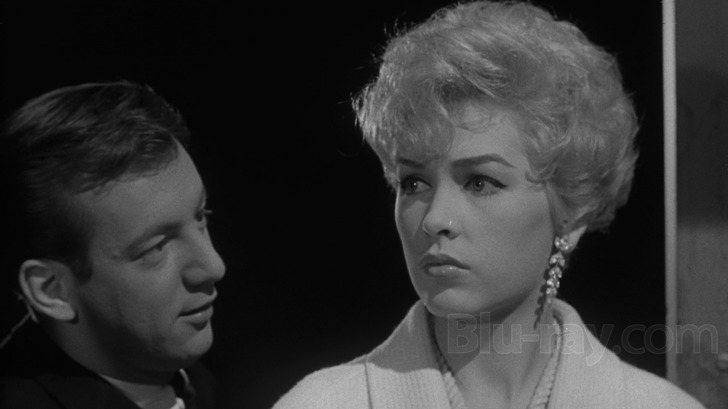
Too Late Blues is presented on Blu-ray courtesy of Olive Films with an AVC encoded 1080p transfer in 1.78:1. This Paramount catalog release features a generally decent black and white image that is acceptably sharp but which never really excels in terms of brilliantly variegated contrast or increased dimensionality. What remains is an above average level of sharpness and clarity, but a kind of pallid overall feel that never really displays luxurious black levels or crisp, appealing whites. The film has generally murky shadow detail, something exacerbated by Cassavetes' predilection for "natural" lighting (whether or not it was actually natural). The longish park scene also displays more softness than the bulk of the film, perhaps due to having been done by a second unit with different cameras and lenses. While there's nothing here that is going to make videophiles' eyes glow with outright amazement, this is a solid, appealing looking transfer that certainly has had no digital tweaking done to it, and which accurately represents the kind of quasi-verité style of filmmaking that Cassavetes would become famous for.
Too Late Blues Blu-ray Movie, Audio Quality 
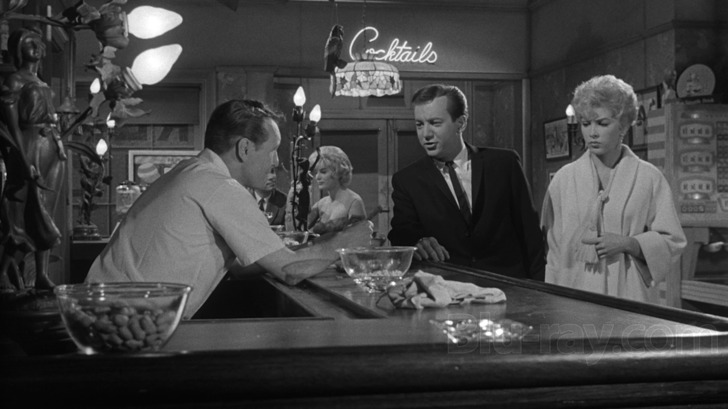
Too Late Blues features a lossless DTS-HD Master Audio Mono track that is surprisingly clear and full sounding, and which reproduces the film's beautiful (if way too brief) music very well. The piano parts are especially nicely rendered, with no brittleness or tinny sound. If that is really Stella Stevens singing, she certainly could have had a professional career as a vocalist. Dialogue is clean and clear and the overall fidelity of this track is excellent. While a stereo track at least could have significantly opened up the music elements, what's here is quite effective, especially since the bulk of this film is a rather quiet, dialogue driven affair.
Too Late Blues Blu-ray Movie, Special Features and Extras 
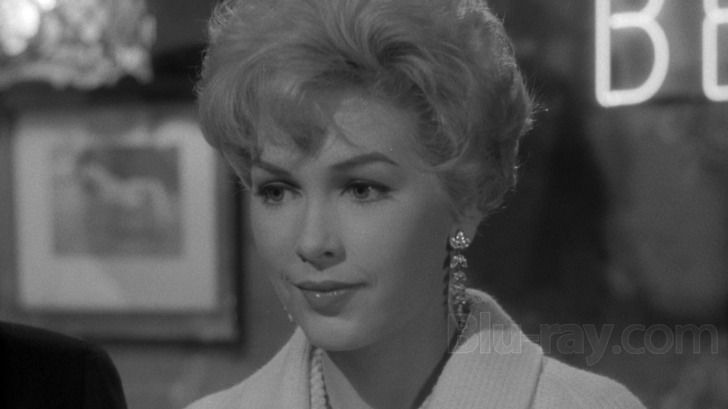
As has been the case with all of these Paramount catalog releases licensed by Olive Films, no supplements of any kind are included on this release.
Too Late Blues Blu-ray Movie, Overall Score and Recommendation 
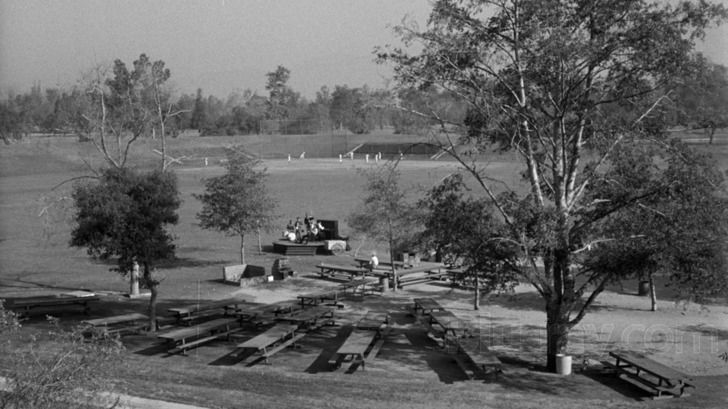
I've made a large part of my living through the years playing jazz, and I know from personal experience it's not an easy lifestyle. The interpersonal dynamics between band mates can often be treacherous territory to traverse, and the simple struggle to regularly land paying gigs also can be a constant source of stress. If Too Late Blues is a bit too pat and sanguine in its portrayal of the rise and fall (and potential rise) of Ghost, it's also an unusually visceral experience, due largely to the very nicely nuanced performances of Darin and (especially) Stevens. Stevens is in fact a marvel in this film, and anyone who has dismissed her film work as second rate should watch this performance to see just how skilled an actress she could really be. Cassavetes is, as was his wont, a bit too self indulgent for his own good, but Too Late Blues is a nice little slice of life film that captures its era very well. Recommended.
Similar titles
Similar titles you might also like

Throne of Blood
蜘蛛巣城 / Kumonosu-jô
1957

The Damned
La caduta degli dei
1969

Heart of Glass
Herz aus Glas
1976

The Insect Woman
にっぽん昆虫記 / Nippon konchûki
1963

Hamlet
1948

Cemetery of Splendor
2015

Hamlet
2009

Vivre sa vie
Vivre sa vie: Film en douze tableaux / My Life to Live
1962

Paterson
2016

The Moment of Truth
Il momento della verità
1965

Horse Money
Cavalo Dinheiro
2014

La Notte
1961

Personal Shopper
2016

Stranger Than Paradise
1984

45 Years
2015

La signora senza camelie
1953

Goodbye, Dragon Inn
不散 / Bu san
2003

Neon Bull
Boi Neon
2015

A Face in the Crowd
1957

Le Amiche
1955